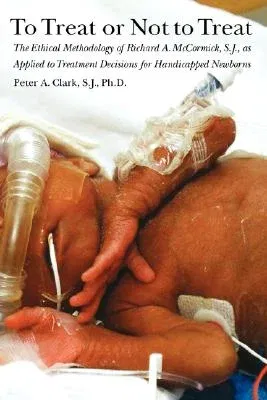Peter a Clark
(Author)To Treat or Not to Treat: The Ethical Methodology of Richard A. McCormick, S.J., as Applied to Treatment Decisions for Handicapped NewbornsPaperback, 1 October 2003

Qty
1
Turbo
Ships in 2 - 3 days
In Stock
Free Delivery
Cash on Delivery
15 Days
Free Returns
Secure Checkout

Print Length
349 pages
Language
English
Publisher
Creighton University Press
Date Published
1 Oct 2003
ISBN-10
1881871444
ISBN-13
9781881871446
Description
Product Details
Author:
Book Format:
Paperback
Country of Origin:
US
Date Published:
1 October 2003
Dimensions:
22.61 x
15.49 x
2.29 cm
ISBN-10:
1881871444
ISBN-13:
9781881871446
Language:
English
Location:
New York
Pages:
349
Publisher:
Weight:
521.63 gm